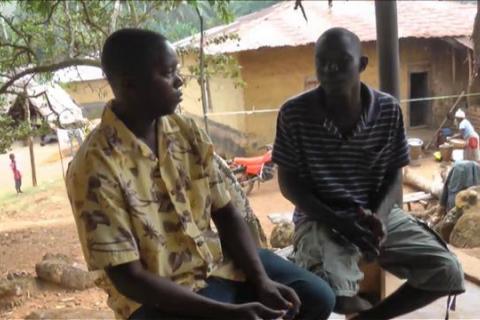“Live or drive, a choice has to be made”, a case study of Sime Darby operations in Liberia, basta! and Friends of the Earth France, athttp://www.bastamag.net/IMG/pdf/Rap_LiberiaEN.pdf
Other information
"Land grabbing for biofuels must stop”, a new report from GRAIN athttp://www.grain.org/e/4653
"Gentle Treasures: Stories of women against mining", launched in March 2012 by Alyansa Tigil Mina (Alliance to Stop Mining), commemorates the contributions of Filipino women to the struggle against large-scale mining and the promotion of human rights, at http://es.scribd.com/doc/96588780/Gentle-T
“Environmental crime: in pursuit of palm oil industry”, video on the business of palm oil in Liberia
On January 29, 2013, at about 4:30pm, a protest of peasants was violently repressed in South Sumatra by the Regional Police. About 25 people were beaten and arrested, peasants and also three activists including Anwar Sadat, Director of WALHI South Sumatra, the main environmental NGO of the country.
Please help release Anwar and the other arrested people by signing the On Line Petition: www.change.org/ReleaseAnwar
Since 1881, the Chilean state has attempted to “Chileanize” the Mapuche indigenous people, maintaining them in a state of permanent colonialism. The Mapuche people have responded with a long, hard-fought struggle of resistance and defence of their self-determination, as well as demanding the return of their ancestral lands which are currently under the control of large landholders and tree plantation companies.
Sombath Somphone, a farmer, scholar, scientist and community developer as well as a well-known activist in land issues and against mega-dams, has spent his life working for his people and country. He led several projects to improve food security through the use of low-cost and eco-friendly technologies and trained many people including women in participatory planning for integrated rural development as a means to tackle rural poverty.It was through this experience that Sombath came to believe that to alleviate poverty, development approaches must be multi-dimensional and multi-sectoral.
On January 25-27, 2013, social and political organizations and movements from numerous countries in Latin America, the Caribbean and the European Union gathered in Santiago, Chile for the Chile 2013 People’s Summit, held in parallel to the summit between the Community of Latin American and Caribbean States (CELAC) and the European Union (EU), and the CELAC Summit, also held in the Chilean capital.
Brazil’s Landless Workers Movement (MST) has announced, “We are beginning the year 2013 with several struggles, which represent MST’s response to the irresponsibility of governments. If we do not fight for agrarian reform, which is currently at a standstill, and for the punishment of murderer Adriano Chafik, who killed five landless workers and remains at large eight years later, it would be as if we ourselves were all dead.”
The French industry ministry recently issued a gold mining permitfor an area in the middle of Guiana Amazonian Park in French Guiana.Thousands of prospectorsare digging up the French Guianese jungle and river sediments insearch of gold, polluting the region and destroying itsecosystems.
The residents of the affected rainforest village Saül are voicing their protest together with environmentalists and researchers.
Following a collaborative study conducted in the four Protected Areas: Nagarhole, Bandipur, Mudumalai and Wayanad, several social groups came together in Gudalur on December 21- 22, 2012. After discussing the state of the Protected Areas of the Nigiris Biosphere Reserve, repeated violation of the Forest Rights Act, 2006 and the Wildlife Protection Act - Amendment of 2006, the continued dispossession of the communities from their traditional habitat and community resources, The Gudalur Declaration was adopted declaring all the Tiger Reserves in the Nilgiris Biosphere Reserves as illegal.
Through its Google Group and Facebook page Aldaw will provide periodical updates of news and articles on oil palm development in the Philippines, as well as globally.The bulletin may include information and news on related topics suchas biofuels, bioenergy, industrial agriculture and forestry monocultures. There will be no specific dates for releasing the bulletin which will be circulated as soon as a sufficient amount of information is collated.

